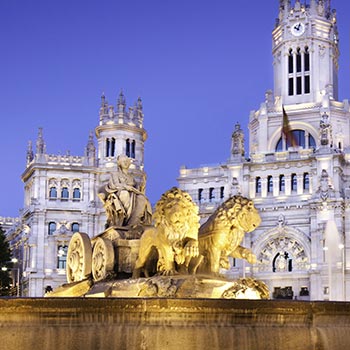History of the World Economy
Engineering & Social Sciences Program
Madrid, Spain
Dates: 1/18/24 - 6/5/24

History of the World Economy
OVERVIEW
CEA CAPA Partner Institution: Universidad Carlos III de Madrid
Location: Madrid, Spain
Primary Subject Area: History
Other Subject Area: Global Studies
Instruction in: English
Course Code: 16621
Transcript Source: Partner Institution
Course Details: Level 100
Recommended Semester Credits: 3
Contact Hours: 42
DESCRIPTION
I. The development of a world economy in the early modern period: the formation of national and international commodity markets, institutional change and foundations of modern economic growth
II. The first globalization of the long nineteenth century (c. 1820-1913)
- The Great Divergence and the Great Specialization. The integration intercontinental commodity markets, international migration and capital mobility.
- The formation of an international monetary system, of global communication systems and coordination of trade policy
- Causes and effects of the factor and commodity market integration in "central" and "peripheral" countries
III. Deglobalization and international disintegration (c. 1914-1945)
- The First World War, political instability and the restoration of prewar economic institutions and arrangements
- The great depression, the collapse of the interwar gold standard and disintegration of international markets
IV. The reconstruction of the international economy after 1945 and the second globalization
- Consequences of the Second World War: communism, decolonization and the Cold War
- Rise and fall of the Bretton Woods system
- Crisis, recovery and the second globalization in the Western world, c. 1970 to today.
- Emerging economies, technical change and decentralization of production in multinational firms and value chains.
- Changing models and paradigms of domestic economic policy; the role of international organizations and international markets in their formulation and transmission. Formation of regional economic areas and renewal of international economic institutions since the 1990s.
V. The world economy in the early 21st century
- Convergence and divergence of productivity and living standards between countries and evolution of economic inequality between and within countries.
- The future of globalization: political, economic and social challenges
II. The first globalization of the long nineteenth century (c. 1820-1913)
- The Great Divergence and the Great Specialization. The integration intercontinental commodity markets, international migration and capital mobility.
- The formation of an international monetary system, of global communication systems and coordination of trade policy
- Causes and effects of the factor and commodity market integration in "central" and "peripheral" countries
III. Deglobalization and international disintegration (c. 1914-1945)
- The First World War, political instability and the restoration of prewar economic institutions and arrangements
- The great depression, the collapse of the interwar gold standard and disintegration of international markets
IV. The reconstruction of the international economy after 1945 and the second globalization
- Consequences of the Second World War: communism, decolonization and the Cold War
- Rise and fall of the Bretton Woods system
- Crisis, recovery and the second globalization in the Western world, c. 1970 to today.
- Emerging economies, technical change and decentralization of production in multinational firms and value chains.
- Changing models and paradigms of domestic economic policy; the role of international organizations and international markets in their formulation and transmission. Formation of regional economic areas and renewal of international economic institutions since the 1990s.
V. The world economy in the early 21st century
- Convergence and divergence of productivity and living standards between countries and evolution of economic inequality between and within countries.
- The future of globalization: political, economic and social challenges







